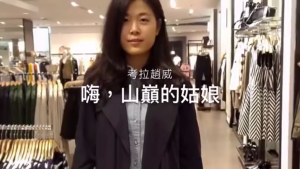The Word of the Week comes from the Grass-Mud Horse Lexicon, a glossary of terms created by Chinese netizens and encountered in online political discussions. These are the words of China’s online “resistance discourse,” used to mock and subvert the official language around censorship and political correctness.
shāndiān 山巅

Zhao Wei, the “Girl at the Summit,” was in fact charged with the heavier crime of “subversion.” She was released but remains under state surveillance and control.
Literally “mountain top” or “summit”; code for “incite subversion” (shāndiān 煽颠).
“Inciting subversion of state power” (shāndòng diānfù guójiā zhèngquán zuì 煽动颠覆国家政权罪), listed in Article 101 of China’s Criminal Law, includes “spreading rumors or slanders or any other means to subvert state power or overthrow the socialist system” and is punishable by up to five years in prison, or more if the defendant is judged to be a “ringleader” or to have committed other crimes. Activist Liu Xiaobo was sentenced to 11 years in prison for the charge of inciting subversion. Liu died in custody on July 13, 2017from multiple organ failure related to late state liver cancer.
When Hong Kong protesters unfurled a banner over Lion Rock reading “I want real universal suffrage” in 2014, Weibo user LüshiFengyanqiang (@律师冯延强) marveled, “Dang, now that’s the summit! (晕,绝对山颠啊!)
In January 2016, paralegal Zhao Wei faced the charge of “subversion of state power,” which carries a maximum sentence of life imprisonment. The charge was unexpectedly heavy. Assuming she stood accused merely of “inciting subversion,” supporters made a video montage of Zhao, set to a new song, “Girl at the Summit.”
Can’t get enough of subversive Chinese netspeak? Check out our latest ebook, “Decoding the Chinese Internet: A Glossary of Political Slang.” Includes dozens of new terms and classic catchphrases, presented in a new, image-rich format. Available for pay-what-you-want (including nothing). All proceeds support CDT.








